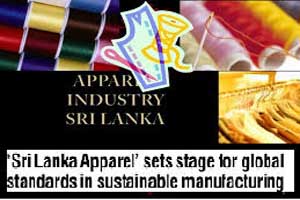
Sri Lankan clothing industry has potential to capitalize further growth
YarnsandFibers News Bureau 2015-10-23 17:00:00 – ColomboThe Sri Lankan clothing industry has been a pioneer in adopting environmentally friendly manufacturing and waste management methods in order to improve its market image—at a time when the clothing industries in other countries have struggled to maintain theirs. It has built up a good reputation for quality and delivery among buyers in the markets of developed countries and has the potential to capitalise further on its inherent strengths, according to a report in the latest issue of Textile Outlook International from the global business information company Textiles Intelligence.
Also Sri Lanka’s clothing exports have done well in recent years. Between 2009 and 2014 they grew by over 51%—despite unfavourable conditions in foreign markets since the global recession in 2009 and the industry’s loss of GSP+ concessions in the EU import market in mid-2010. These concessions provided the Sri Lankan clothing industry with duty-free access to the EU market but they were withdrawn as a result of concerns over Sri Lanka’s record on human rights.
However, the industry has benefited from a government which has been highly supportive by creating an environment conducive to business in the country and providing tax incentives to encourage foreign direct investment (FDI).
In particular, the Sri Lankan government has introduced incentives to encourage the establishment of manufacturing facilities in the more rural and less developed parts of the country—including the previously war-torn eastern and northern regions—where there are plentiful supplies of labour willing to work for lower wages than in Colombo and its surroundings.
Moreover, Sri Lanka is entering a new phase of political and economic harmony following the election in January 2015 of a new president and the appointment of a new prime minister—whose policies were reaffirmed in a parliamentary election in August 2015.
The new prime minister has promised to implement better governance, a market-friendly economic policy and a more pro-Western stance. As a result, there will be a renewed emphasis on encouraging foreign companies to establish export oriented manufacturing operations in the country and this could be encouraged by offering even stronger investment incentives.
At the same time, the clothing industry hopes to secure higher exports to the EU through the restoration of GSP+ concessions. Such restoration would provide exports from Sri Lanka with tariff-free access to EU markets and could lead to a sizeable increase in clothing shipments.
On the negative side, if GSP+ status in the EU market is not restored, Sri Lanka’s clothing producers would remain at a long-term disadvantage in the face of competitors in Pakistan who do benefit from duty-free access to the EU under GSP+, or those in Bangladesh and Cambodia who benefit from duty-free access to the EU under the GSP Everything But Arms (EBA) scheme.
Also with the Trans-Pacific Partnership (TPP) expected to favour Vietnam and Malaysia, Sri Lanka’s competitive position in the crucial US market likely to be threatened.
Market Intelligence
Ask for free sample Report

experience
Customer Base
dedicated team
Countries Served Worldwide









